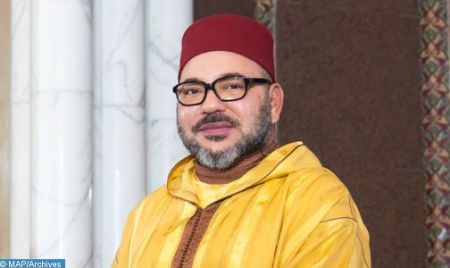
Kigali: On July 30, 2019, the Kingdom of Morocco celebrates the 20th Anniversary of His Majesty Mohammed VI’s accession to the Throne. The commemoration is a renewed chance to demonstrate the strong connection amongst the people of Morocco and the Throne.
Since 1999, there has been drastic change in the political, economic and social conditions under the Reign of King Mohammed VI. The country has known a remarkable evolution in many fields. Over the years Morocco has also strengthened, accelerated, and broadened democratic reforms, in order to empower individual citizens and the institutions that represent them.
Thanks to this internal dynamism, His Majesty the King Mohammed VI has put in place an innovative strategy of cooperation with the other African countries, materialized by the signature of more than 1000 conventions and agreements during 50 Royal visits in more than 30 countries during the last 20 years.
These actions were concluded by investing in Africa around US $ 3 billion during the period 2008-2017, which equates to 80% of Moroccan investments abroad. The
Kingdom thus became the 2 nd largest African investor on the continent, the leading African investor in West Africa.
In sum, Morocco’s cooperation with Africa is integrated and multidimensional, combining the economic, the social and the cultural dimensions.
Under the King’s leadership, Morocco has also deepened its partnership with its partners in Europe and the MENA region as well as with USA with which has signed a free trade agreement.
On the other hand, Morocco was a key-player in the defense of several international causes for which the country has focused as priority and which especially the following topics are:
Morocco’s commitment toward migration
Morocco is party to several international instruments of human rights, migrant law and international refugee law. It was among the first countries to join the international awareness of migration issues by ratifying in 1993 the International Convention on the Protection of the Rights of All Migrant Workers and Members of Their Families.
Having a long experience in different aspects of migration, Morocco is actively involved in all the Regional and International Consultation Processes on Migration (High Level Dialogue on Migration and Development, Valetta Process, Process of Rabat, 5 + 5 Dialogue, Global Forum on Migration and Development and the Global Compact on Migration).
Since 2013, Morocco has had a national immigration and asylum policy, based on a humanist approach, in line with Morocco’s international commitments and respectful of the rights of immigrants. Morocco also adopted, in December 2014, a national immigration and asylum strategy based on the socio-economic integration of immigrants. Two exceptional regularization operations for foreigners in an irregular administrative situation in the national territory took place in 2014 and 2016, which benefited to 50,756 migrants, 23,464 of whom obtained a residence permit.
The appointment of His Majesty the King Mohammed VI by the African Union as Leader of migration is making Morocco as an active and committed defender of African interests both regionally and internationally. Morocco has also made the integration of migration as a priority into its development policies. In this context, Morocco has chaired the 11th Summit of the Global Forum on Migration and Development that took place in Marrakech from 5 to 7 December 2018, and has also hosted the Intergovernmental Conference for the Adoption of the Global Compact for Safe, Orderly and Regular Migration on 10 th and 11 th December 2018 in Marrakesh, which was adopted by 165 countries.
Protection of the environment
Morocco has adopted in its development strategy the concept of sustainable development that promotes the balance between the environmental, economic and social dimensions. In this regard, Morocco has established the foundations for achieving sustainable development through several political, institutional, legal and socio-economic reforms. In 2016, Morocco has developed and presented at COP22 the National Strategy for Sustainable Development (SNDD). Morocco was behind of several initiatives aimed at strengthening Africa’s resilience to climate threats, notably the African Initiative for Adaptation; the initiative for Adaptation of African Agriculture called Triple A. In this context, Morocco has always been available to share with the rest of the continent its experience and expertise in the fight against climate change, which has resulted in particular in its effective participation in the process of the implementation of the Climate Commission of the Congo Basin and Blue Fund for the Congo Basin and its participation in the support of feasibility studies to finalize the Climate Investment Plan for the Sahel region.
The fight against terrorism
Concerning the fight against terrorism, the Kingdom of Morocco has been committed from the beginning to act voluntarily for the establishment of sustainable stability at global, regional and sub-regional levels. In this regard, Morocco has therefore made the strategic choice to promote solidarity-based South-South, North-South and triangular cooperation via the realization of concrete projects with several countries for stability and sustainable development.
Morocco is also promoting the rehabilitation and promotion of religious, cultural, spiritual and human values, as well as the promotion of an environment of tolerance and peaceful coexistence.
Thus, Morocco has created in 2015, the Mohammed VI Foundation for African Ulema, with the main objective of unifying and coordinating the efforts of the Muslim Ulama, from the African States, to promote, disseminate and consolidate the values of tolerance by Islam. The number of Moroccan graduates from the Institute has now reached 2,100 imams and 900 morchidates, and the number of foreign graduates is 1,534.The Institute currently has 1,352 students, notably from Senegal, Mali, Guinea, Cote d’Ivoire, Nigeria, Gabon, Chad and France. (Fin)
